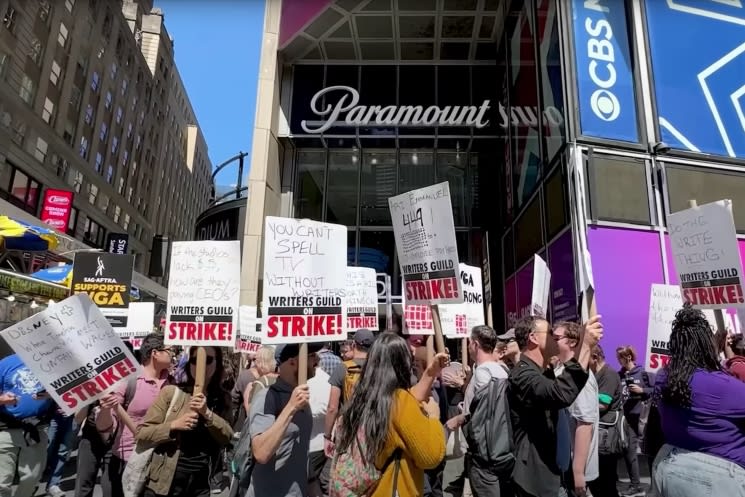It hasn't been occupying quite as much attention in the news cycle lately, but the Writers Guild of America (WGA) strike is still ongoing — and it sounds like film and TV studios have no plans to bring it to an end until writers start going broke (even though they already are and that's why they're striking?).
According to a new report from Deadline, the Alliance of Motion Picture and Television Producers (AMPTP) is in it for the long haul. "I think we're in for a long strike, they're going to let it bleed out," an industry veteran familiar with the mindset of studio CEOs told the publication.
Writers have been on strike since the beginning of May, and the AMPTP is allegedly prepared to let it go on for months more. "The endgame is to allow things to drag on until union members start losing their apartments and losing their houses," a studio executive told Deadline — a statement reportedly reiterated by multiple other sources, with one insider calling it "a cruel but necessary evil."
The studios and AMPTP reportedly believe that by October, after five months on the picket lines without work, most WGA writers will be running out of money. Studios and streaming services think this sense of desperation will "break the WGA," putting the production companies in the position to set the most of the terms in negotiating any possible deal.
In the wake of the strike, most networks have been forced to focus on unscripted and foreign content, with production on shows like Stranger Things, Yellowjackets, Saturday Night Live and Abbott Elementary put on pause.
Canadian writers — as well as Snoop Dogg, Imagine Dragons, Flavor Flav and many other celebrities — stand in solidarity with WGA members, who are fighting for fair wages after a decade of exorbitant studio revenue and decreased writers' salaries. The only thing that has increased for film and TV writers is the precariousness of a steady income in the streaming age, with the absence of cable and broadcast syndication money and the reduced length of TV series.
According to a new report from Deadline, the Alliance of Motion Picture and Television Producers (AMPTP) is in it for the long haul. "I think we're in for a long strike, they're going to let it bleed out," an industry veteran familiar with the mindset of studio CEOs told the publication.
Writers have been on strike since the beginning of May, and the AMPTP is allegedly prepared to let it go on for months more. "The endgame is to allow things to drag on until union members start losing their apartments and losing their houses," a studio executive told Deadline — a statement reportedly reiterated by multiple other sources, with one insider calling it "a cruel but necessary evil."
The studios and AMPTP reportedly believe that by October, after five months on the picket lines without work, most WGA writers will be running out of money. Studios and streaming services think this sense of desperation will "break the WGA," putting the production companies in the position to set the most of the terms in negotiating any possible deal.
In the wake of the strike, most networks have been forced to focus on unscripted and foreign content, with production on shows like Stranger Things, Yellowjackets, Saturday Night Live and Abbott Elementary put on pause.
Canadian writers — as well as Snoop Dogg, Imagine Dragons, Flavor Flav and many other celebrities — stand in solidarity with WGA members, who are fighting for fair wages after a decade of exorbitant studio revenue and decreased writers' salaries. The only thing that has increased for film and TV writers is the precariousness of a steady income in the streaming age, with the absence of cable and broadcast syndication money and the reduced length of TV series.




